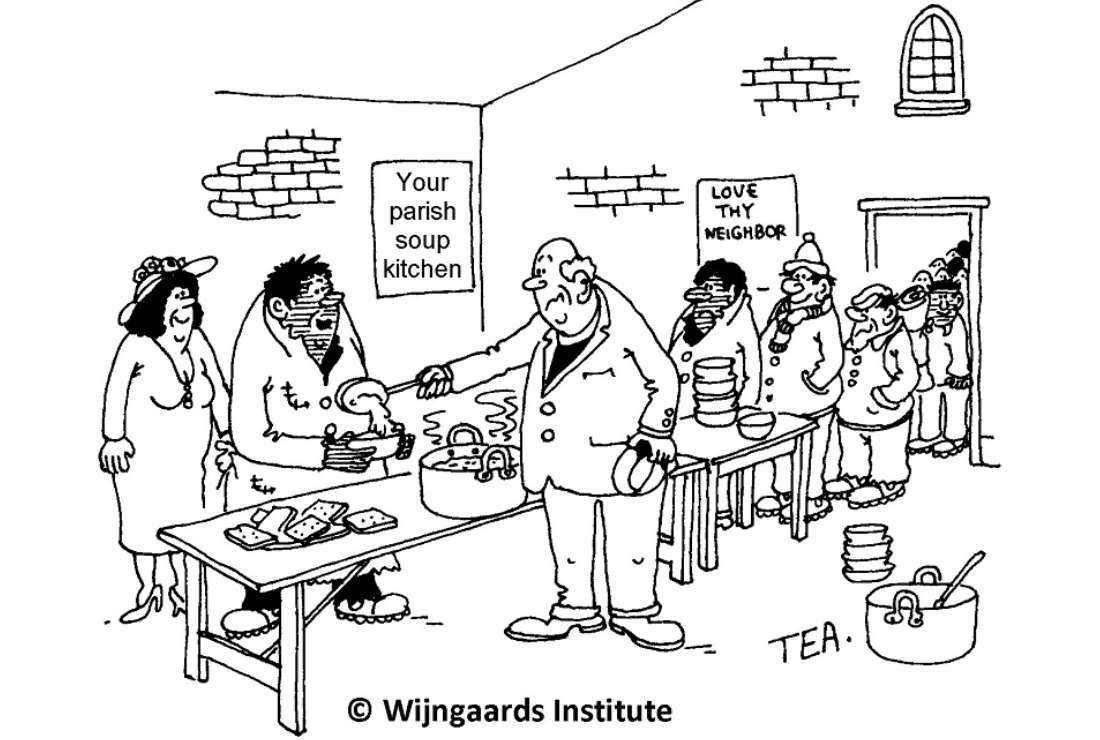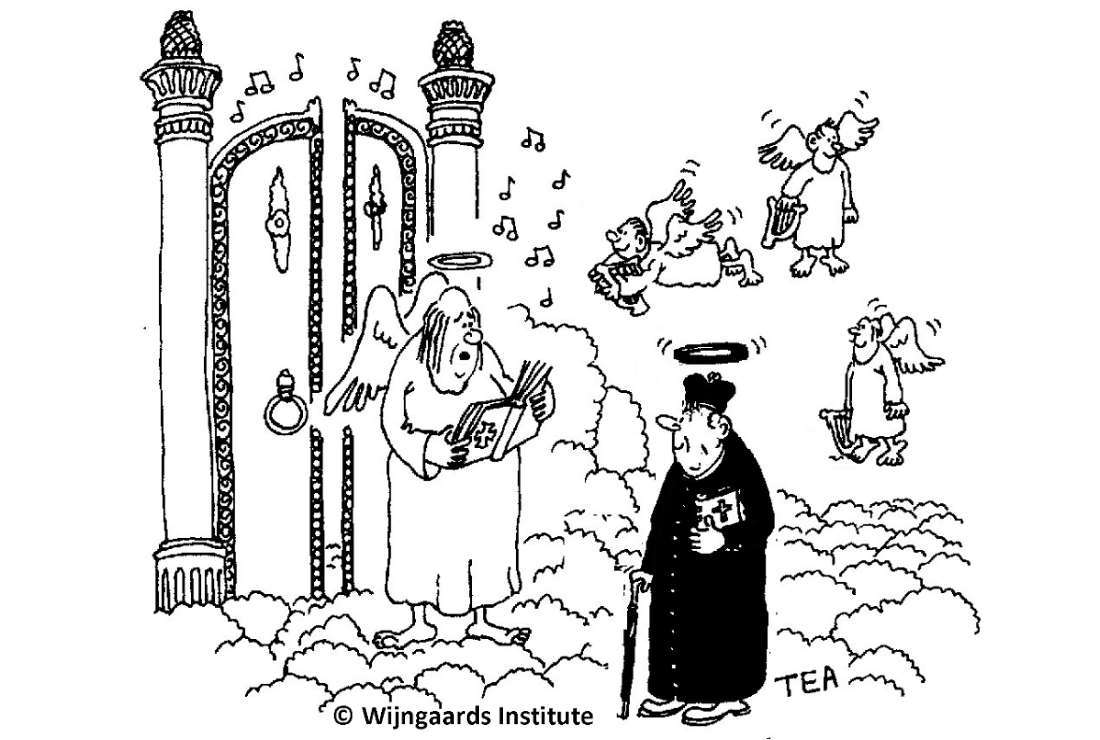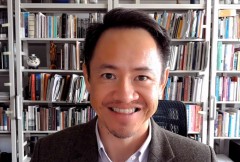At the Last Supper Jesus foretold that future generations of his disciples would need to re-absorb and reformulate his teaching within their own world

“You must also serve meat, Father. Otherwise, I’ll join the Baptists!” (Illustration: Tom Adcock)
“On hearing Jesus’ words, many of his disciples said, ‘This is a hard teaching. Who can accept it?’ … From this time many of his disciples turned back and no longer followed him” (John 6: 60-66).
In the 1980s, while I was still Vicar General of the Mill Hill Missionaries, I had been on a visitation in France. By car, I visited some of our retired missionaries who, after returning from overseas missions, helped out in French parishes. Then I was on my way from Lyons across the Alps to Geneva in Switzerland for a meeting at the World Council of Churches.
Just outside Lyons, I saw a priest, wearing a black cassock and white collar, standing by the roadside asking for a lift. I stopped the car. When he was seated, we introduced ourselves to each other. I will call him Father Paschal.
When I asked him about his ministry, he told me: “I’m still a parish priest, but I am a follower of Bishop Lefebvre”.
“Bishop Lefebvre?!”, I exclaimed. “But Lefebvre is no longer in full communion with the Church!” Bishop Marcel Lefebvre led a conservative bloc during the sessions of the Vatican II Council. He did not accept many decisions by the council. He cut himself from the Church in 1988 by consecrating four bishops against strict prohibitions from the Vatican.
“Well, I agree with Bishop Lefebvre”, he replied. “The Second Vatican Council has made many mistakes. It tolerates ‘religious liberty’, ecumenism, collegiality and other nonsense.”
“They are not nonsense”, I reacted. “They are requirements in our modern age and in harmony with our Catholic faith.”
“Well, you’re misguided”, Father Paschal declared. “I am sure you say Mass in the vernacular?”
“Yes, I do.”
“Well, that’s another atrocity introduced by Vatican II. Latin is our sacred language. It should not be abandoned. I always celebrate the Eucharist in Latin.”
Our discussion came to nothing. When we arrived in Geneva, he took leave from me saying that he would travel on to Écône, where the headquarters of Lefebvre’s Pius X Society was located.
Schism among Jesus’ followers
Hundreds of larger and smaller schisms have happened in the history of the Church. The majority were due to traditionalists not willing to accept a new understanding of doctrine or practice.
It already started in Jesus’ time. Chapter Six in St John’s Gospel narrates how Jesus on the shores of Galilee performed the miracle of the multiplication of the bread and the fish. Five thousand of his followers benefited from this (John 6:10). When Jesus crossed over to the other side of the lake, a large number of them followed him there keen to hear more of his teaching.
In the synagogue of Capernaum, Jesus announced that, like the manna the Jews ate in the desert, he was the Bread of Life. He repeatedly said: “You will eat my flesh and drink my blood,” referring to the establishment of the Eucharist (John 6:25-59).
This was a new development a group of followers did not want to accept. It went against everything they believed as Jews. “On hearing it, many of his disciples said, ‘This is a hard teaching. Who can accept it?’.” (John 6:60) In spite of Jesus’ pleading, they turned their backs on him. “From this time many of his disciples turned back and no longer followed him” (John 6:66).
In response, Jesus did not change his teaching. “Jesus asked the Twelve: ‘Do you want to leave me too?’ Jesus asked the Twelve. Simon Peter answered him, ‘Lord, to whom shall we go? You have the words of eternal life'.” (John 6,67-68)
Not willing to accept a new understanding
At the Last Supper, Jesus foretold that future generations of his disciples would need to re-absorb and reformulate his teaching within their own world. And he promised that his Spirit, active in them, would be able to perform this task. “All this I have spoken while still with you. But the Advocate, the Holy Spirit, whom the Father will send in my name, will teach you all things and will remind you of everything I have said to you” (John 14: 26-27). Again: “I have much more to say to you, more than you can now bear. But when he, the Spirit of truth, comes, he will guide you into all the truth. He will not speak on his own; he will speak only what he hears, and he will tell you what is yet to come” (John 16:12-13).
Jesus also foresaw the possibility of schisms. In his prayer at the Last Supper, he prayed for unity among the disciples. “My prayer is not for them [the Twelve] alone. I pray also for those who will believe in me through their message, that all of them may be one, Father, just as you are in me and I am in you. May they also be in us so that the world may believe that you have sent me. I have given them the glory that you gave me, that they may be one as we are one — I in them and you in me — so that they may be brought to complete unity” (John 17: 20-23).
But Jesus’ prayer for unity does not imply that this unity should be maintained at the cost of rejecting the new developments championed by his Spirit (John 14:26-27; 16:12-13).
Questions
On all levels of the Church, there are traditionalist groupings. They often form closed circles in which members continuously push each other to resist change. Can we, somehow, break into those circles and initiate a meaningful discussion?
Vatican II reforms were often not accepted by people because the justification for them had not been properly explained. Will Church leaders now take care to provide extensive briefings on motives and reasons when introducing reforms?
Published by arrangement with the Wijngaards Institute for Catholic Research
*The views expressed in this article are those of the author and do not necessarily reflect the official editorial position of UCA News.










